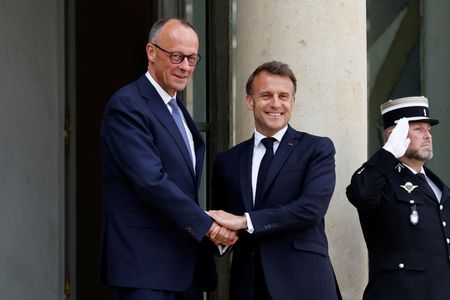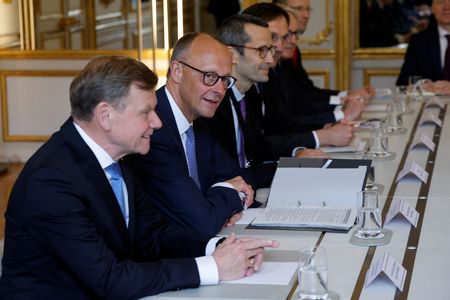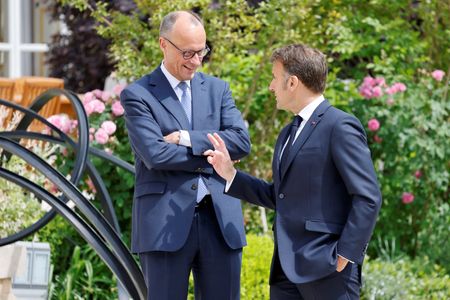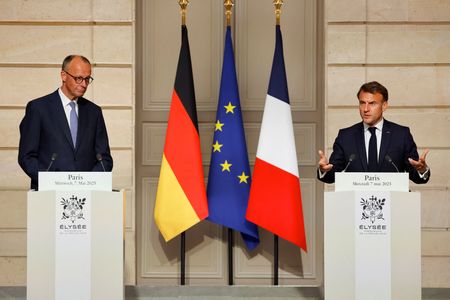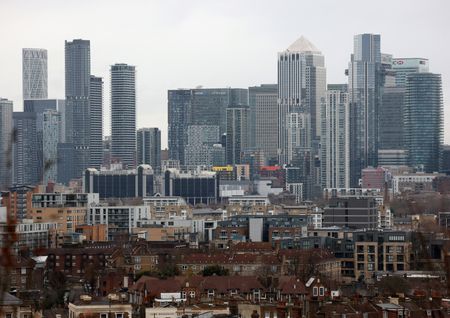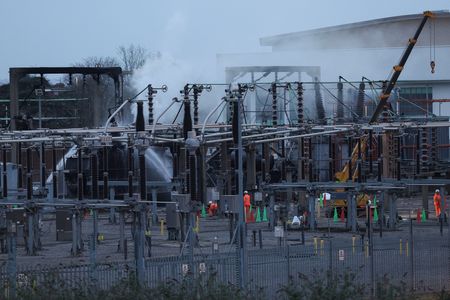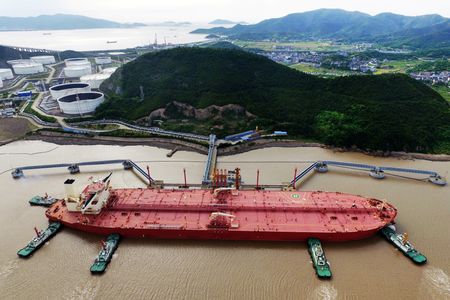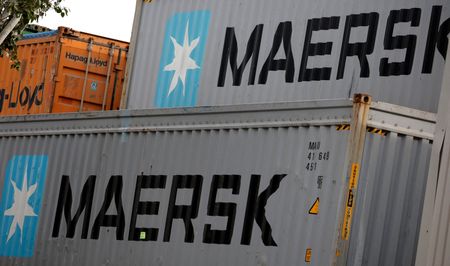By Benoit Van Overstraeten, Andreas Rinke and Anna Koper
BERLIN/PARIS/WARSAW (Reuters) -Germany’s new chancellor Friedrich Merz signalled a new start in relations with European partners France and Poland, but there were signs of tough discussions ahead on thorny issues like illegal migration and defence financing.
Wednesday’s trip came a day after the conservative was sworn in on a promise to restore German leadership in Europe after years of infighting within former Chancellor Olaf Scholz’s three-way coalition and its eventual collapse.
During his campaign, Merz criticized Scholz for neglecting Germany’s ties with its largest neighbours, even as his promise of aggressive new border controls unnerved both governments.
In Paris, appearing alongside French President Emmanuel Macron, Merz said greater European unity was essential to make Europe more secure and competitive and that a Franco-German defence and security council would be strengthened.
“We will only be able to meet these challenges if France and Germany stand even more closely together than in the past,” he said. “That is why Emmanuel Macron and I have agreed on a new Franco-German push for Europe.”
Merz, like Macron a more mercurial personality than Scholz, hails from the far west of Germany, a region where ties to France are traditionally stronger than in Scholz’s native Hamburg.
Hours later, standing with Polish Prime Minister Donald Tusk in Warsaw, Merz lavished praise on Germany’s eastern neighbour for its important military role on NATO’s eastern flank and its support for Ukraine.
But clear differences remained. Tusk, mindful of a presidential election next week in which anti-immigration sentiment is likely to play a big role, voiced careful criticism of Merz’s plan to turn away some immigrants at the border.
“There can be no impression that anyone, including Germany, would like to send any groups of immigrants to Poland,” he said. “Poland will not accept this.”
While Paris is a traditional early port of call for new chancellors, the trip to Warsaw reflects Poland’s increasing influence in European politics because of its centrality in rallying support for Ukraine against Russia’s three-year-old full-scale invasion.
DIFFERENCES WITH FRANCE
With France, differences also remain, in particular on the question of an EU trade deal with South America’s Mercosur bloc, which Paris has resisted.
“I know there are still some points France wants addressed in regard to these agreements, but I believe these are individual matters that do not call the whole into question,” Merz said.
He also said it was too early to say whether Germany might provide security guarantees to Ukraine in the event of a ceasefire – something on which Macron has been more bullish.
“We simply don’t know the conditions yet,” he said.
Merz has however appeared more receptive than Scholz to French proposals on European strategic autonomy and common defence, in part due to the uncertainty U.S. President Donald Trump has cast over ties with Washington.
Macron said Paris and Berlin would accelerate joint programmes to develop new defence capabilities that go beyond combat tanks and long-range missiles.
Merz secured a historic fiscal package before taking office that would let his government dramatically increase borrowing to finance defence spending.
In Warsaw, Merz said he remained sceptical about the idea of Europe collectively borrowing to finance defence spending – something Poland has called for – though he did not rule it out.
But he hinted that military spending could be exempted from the fiscal rules that are binding on EU member states, in an echo of the German package.
BUMPY START
The trip comes after a bumpy start for Merz, who on Tuesday failed in his first bid to win parliamentary confirmation as chancellor, dampening hopes the coalition of his conservatives and Social Democrats might prove more harmonious than Scholz’s government.
Merz has vowed to ensure his government speaks with one voice on the global stage after years in which Scholz and his top ministers often appeared to have differing agendas.
For the first time in decades, the chancellery and the foreign ministry will be run by the same party. Merz wants also to establish a national security council in the chancellery to coordinate foreign, development and defence policy.
“I would hope for some common leadership in Europe,” a Polish government source told Reuters. “Germany has been somehow missing in these discussions in the past.”
Merz told state broadcaster ZDF late on Tuesday he would also speak with Macron and Tusk about adopting a tougher European migration policy. The incoming coalition has agreed to reject asylum seekers at Germany’s land borders but promised to coordinate with nervous European neighbours.
(Reporting by Thomas Escritt, Sarah Marsh, Andreas Rinke, Kirsti Knolle and Rachel More in Berlin, Michel Rose, Benoit Van Overstraeten and Richard Lough in Paris and Alan Charlish in Warsaw; Editing by Cynthia Osterman, Ed Osmond and Rosalba O’Brien)

